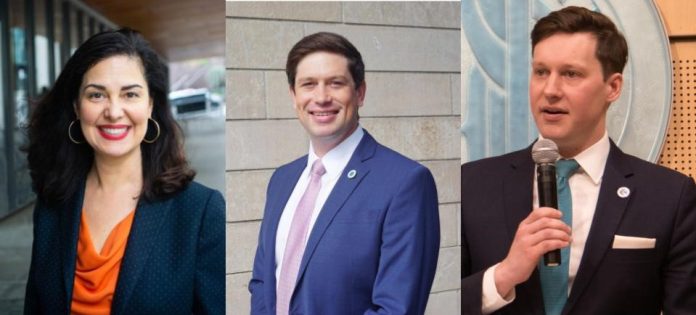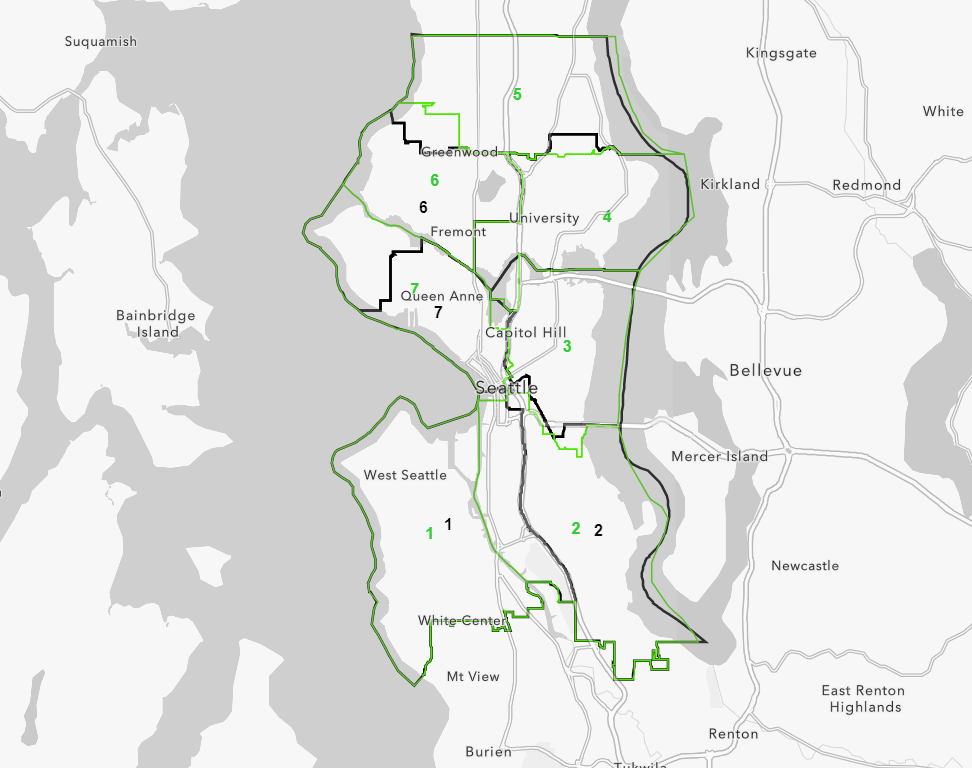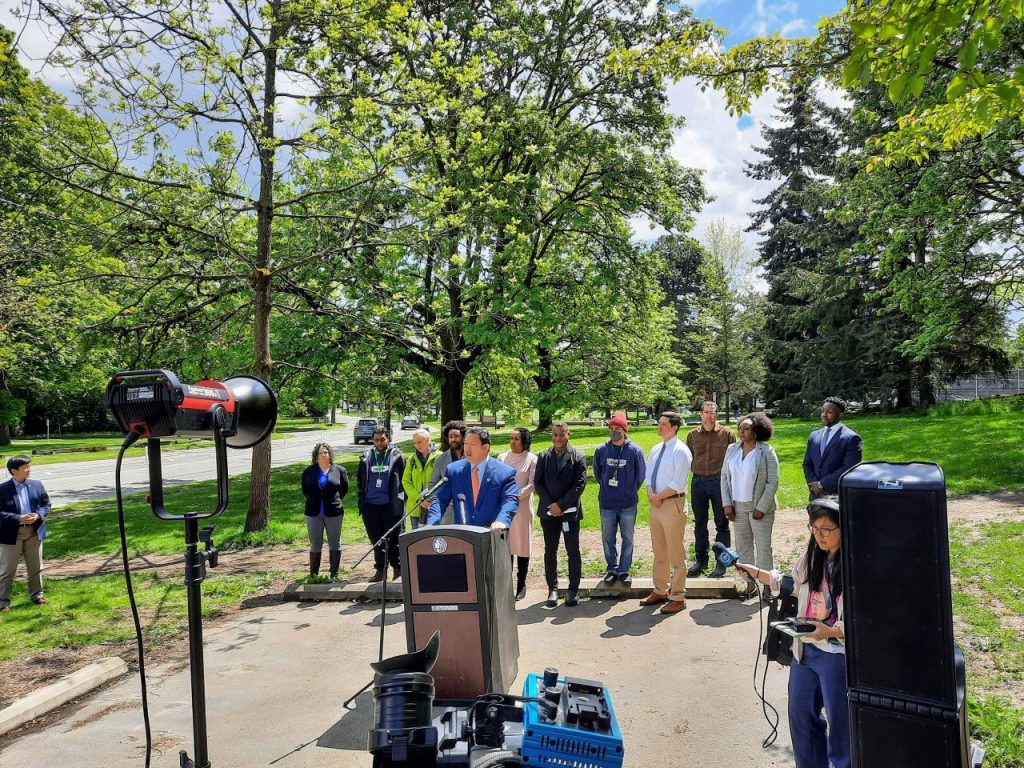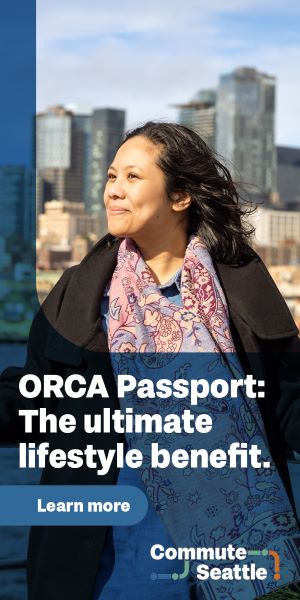
Seven seats on the Seattle City Council are up for grabs this year and the races are starting to firm up ahead of the May 19th candidate filing deadline.
Four sitting councilmembers — Lisa Herbold (District 1), Kshama Sawant (District 3), Alex Pedersen (District 4), and Debora Juarez (District 5) — have declined to run for re-election. The open seat left in their respective districts has led to some crowded races, which The Urbanist will pick apart in subsequent articles. (Part 2 on Districts 1 and 3 is here.)
For now, let’s look at the three races with incumbents (click to jump to the race):
- District 2: South Seattle
- District 6: Ballard, Fremont and Magnolia
- District 7: Downtown and Queen Anne
But first, a word about the dynamics of the race. Much has been made about the unpopularity of Seattle City Council, especially by groups who’d love to shift the Council in a more conservative direction. Polling does suggest high levels of voter frustration that has continued to be directed at the Council more so than the Mayor — even if Seattle’s strong mayor system gives the executive far more control over issues like homelessness and crime over which voters are particularly frustrated.
Nonetheless, the three incumbents in question seem pretty well positioned to win in their races. The exception could be Dan Strauss since his district’s voting patterns have shifted to the right following redistricting that added much of Magnolia to District 6. As we’ll see below, Strauss’s stiffest challenge is coming from the right, and could be well-resourced.

We will be touching on the fundraising numbers since successfully running for office takes resources, but Seattle is also lucky to have publicly-funded campaigns via its Democracy Vouchers program. Each registered Seattle voter gets four $25 vouchers to give to the municipal candidates of their choice. Spend them while you can, because once the $5.25 million available to fund campaigns this year is spent, remaining vouchers lose their value. The voucher program has helped expand the field of candidates, encouraging more people of color and working class Seattleites without personal fortunes to run.
In order to qualify to accept Democracy Vouchers in district-based council races, candidates must gather 150 qualifying contributions of at least $10 and signatures, with at least 75 contributions and signatures coming from within the candidate’s district. The other part of qualifying is to accept spending limits in the race, which are fairly strict at $93,750 for the primary and the same amount for the general (assuming they advance by finishing in the top two).
Ironically, those strict spending caps have magnified the impact of independent expenditure campaigns from political action committees (PACs), as Michael Charles and Michael Fertakis of progressive-leaning political consulting firm Upper Left Strategies argued in a recent op-ed. In the 2019 City Council elections, PAC’s spent nearly $4 million on independent expenditures, which was a fourfold increase from 2017, they noted. The Citizen United Supreme Court ruling enshrines the right of PACs to raise unlimited amounts of money to influence elections. As a result, outside spending may end up exceeding that spent directly by campaigns, with the aid of the Democracy Voucher program.
The biggest players in the independent expenditure game are typically PACs aligned with big business and real estate interests, but labor unions usually make significant investments as well. That promise of investments is why certain endorsements carry such weight.
The two endorsements that carry the biggest weight in local elections are the Seattle Times endorsement on the centrist (homeowner) side and The Stranger endorsement on the progressive side. The vast majority of races see the two candidates with those respective endorsements advancing, although there is the occasional exception. (Of course, The Urbanist is partial to our own endorsements and hope they will carry an increasing sway as well.)
Labor endorsements are also important given the resources they entail, including not just PAC money but also get-out-the-vote operations. And business group endorsements can signal a wave of PAC spending is coming. After their 2019 Amazon money bomb debacle, the Seattle Metropolitan Chamber of Commerce said it won’t do endorsements and no longer has its own aligned PAC, but usually other PACs arise to channel corporate and megarich money to similar purposes. Former Councilmember Tim Burgess’s People for Seattle PAC was an example of this in recent cycles. Burgess is now Director of Strategic Initiative in the Harrell Administration after helping elect him with his fundraising efforts.
But that’s enough table-setting now onto the three council races with incumbents running.
District 2: South Seattle
Tammy Morales is running for a second term and she appears well-positioned to win it. She has qualified for democracy vouchers and also has a big fundraising lead.
Tanya Woo appears to be her primary competition. A Rainier Beach resident well-connected in the Chinatown-International District community, Woo was a vocal opponent of the homeless shelter expansion at the southern edge of Chinatown, arguing too many homelessness services were being concentrated in the neighborhood and that the community hadn’t been sufficiently consulted. Woo’s family owns the Louisa Hotel in Chinatown and she grew up in Beacon Hill.
King County Executive Dow Constantine ended up canceling the shelter expansion and pivoting to backing a proposal to add a light rail station on the site via his alternate proposal to site a new light rail line on either side of Chinatown rather than in the neighborhood. Woo was neutral on the station siting decision, but Morales came out in favor of studying that late-breaking “North and South of CID” alternative backed by Constantine and Mayor Bruce Harrell.
Also running are Isaiah Willoughby and Dawn Marie Lucas, but have reported zero fundraising to the PDC thus far.
Morales has made a name for herself as a champion for traffic safety and for social housing, taking the mantle on those issues which may not have otherwise had a champion. D2 is the epicenter of the road death crisis in Seattle, with more than half of citywide fatalities, so it will likely be important D2’s legislator speaks to those issues. It’s also at the forefront of the displacement crisis, and social housing holds the potential to help on that front too.
District 6: Ballard, Fremont, and Magnolia
Councilmember Dan Strauss is running for reelection and it looks like Pete Hanning will be his primary competition, dogging him from the right.
Hanning is executive director of the Fremont Chamber of Commerce and is running a tough on crime campaign. Strauss has qualified for democracy vouchers. On cash donations, Hanning has raised almost twice as much as Strauss. Whether Hanning can establish credibility at any issues beside coddling business and talking tough on crime remains to be seen. Under Hanning’s leadership, the Fremont Chamber has fought Route 40 bus lanes and is forcing a watered down route upgrade, which could end up royally pissing off thousands of District 6 voters who rely on the beleaguered bus.
Strauss has sought to hug Mayor Harrell after facing backlash over the on-going homelessness crisis and for supporting the move to rein in the Seattle Police Department’s budget in 2020 at the behest of police brutality protesters who were getting tear gassed and blast balled in the street. Strauss appeared with Mayor Harrell to herald encampment removals at Woodland Park and at Ballard Commons Park that allowed that park’s grand reopening. Strauss argued those were examples of encampment removals done right since every resident was engaged with over the course of weeks and offered shelter.

As chair of the land use committee, Strauss has generally used his perch to advance pro-housing policies, but his committee has also moved agonizingly slow at times. He shepherded reforms to classist home occupancy laws that made it easier to run a business from home and a program encouraging street cafes, helping to make Ballard Avenue’s much improved car-light, cafe-heavy business district a reality. Strauss has been outspoken about his own near-death experience biking in Ballard and has pressed for safe street investment. He has recently unveiled a Leary Way alternative to address the Burke-Gilman Trail’s Missing Link in Ballard.
Shea Wilson and Victoria Palmer are also declared in the race.
District 7: Downtown and Queen Anne
Councilmember Andrew Lewis is not just running for reelection, he also leads all candidates in fundraising with more than $70,000 raised already, easily qualifying for democracy vouchers. He hasn’t drawn a high profile centrist machine challenger. Magnolia resident Isabelle Kerner (who also ran in 2019) or Queen Anne Community Councilmember Bob Kettle appear to be the main challengers, both from the homeowner backlash right. Tech worker Ryan Krumbholz briefly flirted with a challenge from the left but dropped out after he botched his campaign rollout.
Lewis has chaired the special committee on homelessness and fought for some commonsense reforms, including a package of streamlining production of new permanent supportive housing that was estimated to save almost $48,000 per unit, trimming costs by 15%. Additionally, he has been outspoken on election reform and spearheaded the effort to put ranked choice voting on the ballot, helping stave off an astroturfed effort to switch to an approval voting system. Recently, Lewis offered an amendment increasing the late fee cap proposed by Kshama Sawant from $10 to $50, but ultimately voted to undo his amendment following backlash from renters. Lewis credited Rian Watt, who chairs The Urbanist Elections Committee, with convincing him the lower late fee cap was superior.
That compromise-focused style might rub some progressives the wrong way, but the fact Lewis hasn’t drawn a strong, well-funded challenge yet may allow left-leaning organizations to focus their resources on other races. Or maybe a big name will get in at the last second.
Doug Trumm is publisher of The Urbanist. An Urbanist writer since 2015, he dreams of pedestrian streets, bus lanes, and a mass-timber building spree to end our housing crisis. He graduated from the Evans School of Public Policy and Governance at the University of Washington in 2019. He lives in Seattle's Fremont neighborhood and loves to explore the city by foot and by bike.


